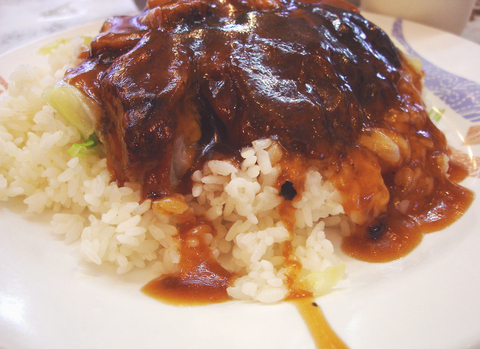More than one person has warned me away from eating at Feng Cheng, but nevertheless it's a popular hangout for lovers of Cantonese cuisine.
Across Xinsheng Road, from the side gate of NTU, Feng Cheng isn't big, but it's no hole in the wall, either, and the round family-sized tables filled up while I ate an early dinner there.
It's not hard to figure out why one might be wary of Feng Cheng: They do the dishes and cook the food in grungy-looking rooms in plain sight of the dining area, sausages hang on colored yarn against the plaster walls, and the green plastic dishes are kept in piles on the tables.

PHOTO: CHRIS PECHSTEDT, TAIPEI TIMES
As for the food, it tastes full of what to the palate are valuable oils, salts, and MSGs. One gets the feeling eating it that one's innermost organs are none too pleased.
And yet there is something worthwhile about this place. The food is appealing, in its own salty sort of way. There are Cantonese staples like shacha (沙茶) and he-fen (河粉) -- a tasty flat noodle you can get with most dishes -- and the barbequed pork (叉燒) and barbecued duck (燒鴨) are said to be famous.
The duck dish came with half an order of pork and at least one of the two meats was pretty good. The kitchen is definitely overzealous with the sauce, though.
One of the nice parts about Feng Cheng is that, even if the food is a bit much for some people, they aren't stingy with the vegetables or the fungi; the abundance of greens and mushrooms often successfully takes the edge off the salt.
Feng Cheng isn't good in the way of the fancy-schmancy NT$300-a-plate stuff we often review, but it does have a sort of guilty appeal similar to that of a greasy family-owned burger joint.
A warning to anyone squeamish around dead animals: The meat is stored in a glass booth that is visible from both the street and the dining area. It's not possible to avoid the sight of dozens of cooked but still very recognizable birds hanging by a single leg. If that sort of thing bothers you, steer clear.
It's certainly possible to find better food in Gongguan for the same price or less, so Feng Cheng is not necessarily the kind of place you'd want to do time on the MRT for, but if you're in the area and you're in the mood for something kind of salty and unhealthy you could do a lot worse -- assuming you aren't faint of stomach.

Towering high above Taiwan’s capital city at 508 meters, Taipei 101 dominates the skyline. The earthquake-proof skyscraper of steel and glass has captured the imagination of professional rock climber Alex Honnold for more than a decade. Tomorrow morning, he will climb it in his signature free solo style — without ropes or protective equipment. And Netflix will broadcast it — live. The event’s announcement has drawn both excitement and trepidation, as well as some concerns over the ethical implications of attempting such a high-risk endeavor on live broadcast. Many have questioned Honnold’s desire to continues his free-solo climbs now that he’s a

As Taiwan’s second most populous city, Taichung looms large in the electoral map. Taiwanese political commentators describe it — along with neighboring Changhua County — as Taiwan’s “swing states” (搖擺州), which is a curious direct borrowing from American election terminology. In the early post-Martial Law era, Taichung was referred to as a “desert of democracy” because while the Democratic Progressive Party (DPP) was winning elections in the north and south, Taichung remained staunchly loyal to the Chinese Nationalist Party (KMT). That changed over time, but in both Changhua and Taichung, the DPP still suffers from a “one-term curse,” with the

Lines between cop and criminal get murky in Joe Carnahan’s The Rip, a crime thriller set across one foggy Miami night, starring Matt Damon and Ben Affleck. Damon and Affleck, of course, are so closely associated with Boston — most recently they produced the 2024 heist movie The Instigators there — that a detour to South Florida puts them, a little awkwardly, in an entirely different movie landscape. This is Miami Vice territory or Elmore Leonard Land, not Southie or The Town. In The Rip, they play Miami narcotics officers who come upon a cartel stash house that Lt. Dane Dumars (Damon)

Today Taiwanese accept as legitimate government control of many aspects of land use. That legitimacy hides in plain sight the way the system of authoritarian land grabs that favored big firms in the developmentalist era has given way to a government land grab system that favors big developers in the modern democratic era. Articles 142 and 143 of the Republic of China (ROC) Constitution form the basis of that control. They incorporate the thinking of Sun Yat-sen (孫逸仙) in considering the problems of land in China. Article 143 states: “All land within the territory of the Republic of China shall